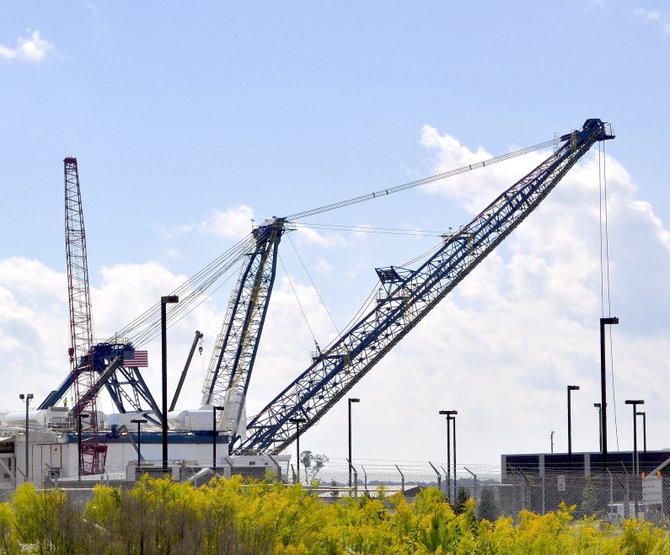Barbara Correro's house sits just off an unpaved road of sandy, bright-red clay and under a canopy of shortleaf and southern yellow pine, sweetgum, oak, flowering dogwood, elm and hickory trees.
A few years ago, she built a deck on the front of her mobile home made out of wood from fallen trees in her 28-acre forest. Some years, she lacquers the porch with the spent motor oil from her car.
Correro considers herself a naturalist. She keeps an organic garden and a few chickens, and cans the occasional jar of honey from her neighbor's bees to take to friends. A retired oncology nurse, she's vigilant about the relationship between the environment and human health. When she retired from her job at an Atlanta hospital, Correro returned to Kemper County, where her family has owned land for generations and where her son, Michael, lives.
For the past two years, though, life in Kemper County's Moscow and Damascus communities has been anything but idyllic.
Correro recently started noticing an uptick in the number of animals that inhabit the forest on her land. There are more owls in the trees and, for the first time, raccoons and opossum trying to get into her chicken feed. The chickens themselves haven't been so lucky.
In the past year, she's lost 11 chickens, she believes, to an increased number of foxes. Some of the wildlife appears emaciated, as if they aren't eating enough, Correro's chickens not withstanding.
"It's just heartbreaking to me," she said.
Correro lays blame for the nature disruption at the feet of Mississippi Power Co. and the power plant and coal mine it's been building since late 2010. Correro and others complain that RV parks have sprung up, and residents have started renting rooms to cash in and accommodate the approximately 6,000 construction workers who are feverishly trying to get the plant completed by spring 2014.
In recent months, the amount of work—and, by extension, the noise, dust and number of people—has increased dramatically, Correro said. The first shift starts at 5 a.m., meaning heavy trucks start rolling down U.S. Highway 493 before sunrise.
To make room, Mississippi Power has razed some 2,968 acres of forest for the power plant and the accompanying lignite coal mine that will serve as the main feedstock for the 582-megawatt generating station. Once finished, the Ratcliffe plant will start putting electricity onto the grid for 23 counties in southwest Mississippi. Hence, the migration of wildlife to Correro's forest, she believes.
The plant itself is an impressive roughly 300-foot structure that looks so modern and high-tech that the sheiks of Dubai could have imagined it. Mississippi Power has touted the Kemper County plant's IGCC (integrated gasification combined-cycle) technology, which captures and stores carbon dioxide, as exemplary of the utility's ability to fight the world's climate crisis while not turning away from a useful, plentiful natural resource: coal.
Since its inception, the Kemper plant—the first of its kind to operate commercially the United States—has been steeped in controversy. Construction costs have more than doubled from the original estimated price tag of $1.8 billion; they're now closer to $5 billion. Officially, the Mississippi Public Service Commission, which regulates utilities in the state, capped construction costs at $2.4 billion. However, Mississippi Power can ask for permission to charge its customers more during so-called prudency hearings scheduled to take place the first part of 2014.
In the meantime, the company has already received the OK to raise electricity rates 15 percent this year, and it has approval to charge another 3 percent increase in 2014, even though critics believe the actual increases will be much higher.
Arguably, residents next door to the plant in rural Kemper County will feel the longest-lasting effects. From up to two miles away, they can hear beeps from the massive dirt movers and other construction sounds coming from the site. At night, neighbors describe the light emanating from the plant as similar to that of an international airport.
Correro and her neighbors look forward to the work being done on the plant—though many express skepticism about the stated end date—when the sounds of construction will go away, and the local highways during a shift change no longer resemble Southern California's gridlock. The locals want to feel comfortable keeping their doors unlocked at night once more. But even then, many fear that life in rural Kemper County will never be the same.
Money No Obstacle
In Barbara Correro's kitchen, cornbread and potato quiche bake in the oven as she pours glasses of unsweetened iced green tea for visitors, which included a Jackson Free Press reporter and photographer.
Correro assembled a group of friends and neighbors from the nearby Damascus and Moscow communities, some of whom have reaped benefits from the Kemper County plant but generally oppose it. But all are worried about the long-term effects of the power plant and lignite mine.
"The traffic is a nuisance, but that is not the issue here," said Correro's son, Michael, who lives about a half mile up the road from his mother.
Situated between them is an 88-acre tract of land that belonged to Correro family members before it changed hands—between family members a few times and a couple times between strangers. The current owner leases the property to Mississippi Power.
Michael Correro is one of the few people on his road who has not sold or leased their property. Scrubby sandy lots once lush with pine, oak and pecan trees surround his bungalow.
Near the Chickasawhay Creek, which forms the western border of the power plant and mine, Michael Correro notices a new fence. He says rust-colored gates in the driveways of handsome ranch-style houses that are now boarded up and fenced off make it easy to identify properties the mine operators now own.
"Money appears to be no obstacle," he said.
Neighbors wonder why the company has bought most of the land around the creek and is gobbling up more. At the price of $10,000 to $12,000 an acre and lease rates of $300 per square foot, the plant paid roughly three times the market rate before work started on U.S. Highway 493. Mississippi Power declined to confirm these sums, citing confidentiality agreements.
Some clues lie within in the 2009 draft environmental-impact study federal regulators required of Mississippi Power before the company could officially start work.
"Mississippi Power plans to acquire additional properties adjacent to the proposed power-plant site for use as buffer areas. Approximately 1,400 acres of land immediately north and east of the site have been acquired, optioned or identified for acquisition. None of the planned buffer land would be used during project construction or for permanent project facilities," the report states.
Information from Mississippi Power has been so closely held (the company declined to make officials available for this story as well) that word-of-mouth and the local rumor mill are the most reliable sources of news about the plant.
Back at Barbara Correro's kitchen table, the neighbors share gossip, which sometimes involves debunking some of the more popular rumors. When Michael Correro starts telling the story about a Kemper worker, who supposedly died from electrocution a few weeks ago, his mother cuts him off.
"No, it was a burn, but he survived it," Barbara informed her son.
"But the interesting thing is that they took him to Tennessee," Michael continued.
"Because they've got an excellent burn unit," Barbara explained.
Absent any kind of reliable community-engagement apparatus, local residents say they have no choice but to speculate. The utility does have a community-relations, Verdell Hawkins, who has an office near the construction site, but locals are largely unaware of Hawkins' presence.
"I don't know what's going into the groundwater, I don't know what's going into the air," said Barbara's friend Jennifer, a former federal employee who asked only to be identified by her first name.
Again, the environmental study provides some answers to Jennifer's questions.
Engineers designed Kemper to run on technology called TRIG, which converts lignite coal, which is soft but abundant in Mississippi, into gas. The plant will then burn that gas to power a turbine that will help offset increasing demand for electricity in steamy Mississippi. The process promises to capture as much as two-thirds of the carbon dioxide it produces rather than letting it escape into the atmosphere like traditional coal plants. But lignite is less energy-dense than coals that come from states like Wyoming and West Virginia, and it contains more pollutants including sulfur dioxide.
TRIG is designed to separate those harmful byproducts, and the plant could sell some of the waste, including anhydrous ammonia and carbon dioxide, as commodities.
In the mid-1990s, Southern Co., started developing the TRIG technology along with one of the world's largest engineering firms, KBR, which was part of Halliburton until 2006. Southern and KBR agreed that if the first facility in Mississippi proved successful, the partners could sell the technology to customers around the globe.
The companies inked a deal with Denbury Resources, which buys carbon dioxide and injects it into fallow oil fields to recover oil that is too deep for the conventional oil drilling technology of the 1950s, 60s and 70s. Authors Dub Taft and Sam Heys explain the TRIG technology in Southern Co.'s corporate biography "Big Bets," available as a free download on Southern Co.'s website.
"I think those two projects are demonstrations that Southern Company is committed to leading-edge technology and finding solutions to move forward in how we make and use energy," David Ratcliffe, Southern Co.'s former CEO and namesake of the Kemper generation facility internally called Plant Ratcliffe, told the authors of "Big Bets."
"It is truly 21st-century technology."
A Heavy Load
In its literature about the Kemper plant, Mississippi Power's position is that the state is growing and needs more electricity-generating capacity.
"We need a large power plant to meet future energy-load growth. The Kemper County energy facility will help us to continue to serve our customers with reliable, affordable and environmentally friendly electricity," the company states on its website's frequently asked questions page for the plant.
The U.S. Department of Energy, which has supported the Kemper project, echoes this view.
In 2009, the DOE noted in its energy profile for Mississippi that the state's "electric power production is low given its high per-capita consumption, and as a result, the state imports electricity from neighboring states in order to satisfy consumer demand."
With the exception of one other mine in Choctaw County that supplies lignite coal to Mississippi Power's Red Hills plant, Mississippi utilities import most of the fuel used by coal-fired generators from relatively close states such as Kentucky and Illinois. Some coal comes from as far away as Colorado.
Entergy Corp., headquartered in New Orleans, runs the state's only nuclear facility: the Grand Gulf Nuclear Generating Station near Port Gibson. The approximately 1-gigawatt reactor provides electricity to a quarter of Mississippi, including Jackson.
Dr. Francis Tuluri, an associate professor of physics at Jackson State University, believes increasing the nation's nuclear capacity is a good idea, in addition to investing heavily in renewable energy.
"Solar energy was considered, and a lot of research was promoted 10 to 15 years ago on photovoltaic cells and semiconductor technology, but not much impetus is there," to promote large-scale production, he said.
Tuluri draws a parallel between using coal and using oil, another energy addiction that America has not shown the political will or cultural appetite to move off.
"Even for the past 10 years, the United States was considering automotive reforms but did not go ahead with new regulations or reforms because the abundance of gasoline is still there—and for years to come," Tuluri said.
Barbour's Baby
Jennifer, Barbara Correro's friend and neighbor, said she might not be so suspicious of Mississippi Power and as vehemently opposed to the Kemper plant if the politics that birthed it were less dubious.
"Coming from a federal contracts background, I was only allowed to accept a coffee cup with a contractor's name on it, and I had to report a lunch that was over five bucks. It's a little tricky when you start looking at how this came to be," she said of the plant's political origins.
In June 2008, then-Gov. Haley Barbour took to the podium for the traditional gubernatorial keynote at the Neshoba County Fair. Barbour, who was in his second term, wore a red-and-blue plaid shirt and dark jeans, and made an oft-repeated gag about his spouse of 25 years, Marsha, being a trophy wife. He then talked about developing the state's energy economy.
The capstone of Barbour's energy policy was the then-recently proposed $1.8 billion coal-gasification power plant in Kemper County. It would be the first commercial facility in the U.S. to capture and sequester carbon, and one of only a handful of new coal plants built in the U.S. in the past decade.
"Our energy policy is more energy," Barbour quipped.
In the ensuing five years, Kemper has consumed a tremendous amount of energy, politically speaking. The energy is necessary partly because of activism from environmental groups like the San Francisco-based Sierra Club—which usually shows up with lawsuits—and partly because utilities themselves started seeing the writing on the wall. Old, dirty coal plants represent a huge liability for them.
Louie Miller, state director of the Mississippi Sierra Club, which has somewhat slowed the plant's progress through the courts, said the latest cost overruns have demonstrated what his organization has said in court filings and public statements.
"The wheels are wobbling on this thing and, in all likelihood, (they're) going to come off," Miller said.
Mississippi Power is doing everything it can to prevent that. Shortly after receiving regulatory approval for the plant in 2008, Mississippi Power hired a small army of a dozen lobbyists. From 2010 to 2012, the company spent $500,000 on lobbyist salaries. The lobbyists themselves doled out thousands of dollars worth of meals to state lawmakers, their staffs and spouses.
Meanwhile, Southern Co. retained Barbour's lobbying firm, the BGR Group. Since 2000, Southern Co. has paid BGR Group more than $2.6 million, according to a database run by the Washington, D.C.-based nonprofit Center for Responsive Politics. During his reign as Mississippi's governor, Barbour said he placed his BGR assets into a blind trust; however, when his second term ended in 2012, Barbour returned to the firm, where he remains a vocal supporter of the Kemper plan.
'Super Jobs'
Kemper County consistently ranks as one of Mississippi's poorest. As of July 2013, only six counties had higher unemployment rates than Kemper.
State Sen. Sampson Jackson, a Democrat from Preston, said that when the plant is finished, some of the workers might be able to secure employment with the coal mine. He also sees opportunities for ancillary, related and research-and-development businesses to locate nearby.
"They're super jobs. Anybody who wants to work can get a job there," Jackson said.
James Hurtt is a plumbing contractor who hoped to land one of the plant's lucrative subcontracts, but said he only received an invitation to bid on a few jobs. He was not successful in winning those bids.
"A local man can't afford to work over there," he said in a telephone interview. "I own my own business, and they offered me $12 (per hour) to come over there and work. I haven't worked for that since the 80s."
Residents complain that Mississippi Power hired far fewer local people than the company promised. As of July, the utility reported to the public-service commission that 1,932 Mississippians are employed as construction workers, but the company does not break the information down by county.
Patrick Scott, an Army veteran who lives in the area, disagrees with Jackson's assessment of the quality of the plant's employment offerings.
Scott said a friend helped him get a truck-driving job because he heard the contractor was offering $14 per hour, but when he accepted the position he learned that the rate was $11.
Wages vary from job to job and between contractors, but Scott believes he was laid off for raising a ruckus about the pay differences between people doing similar jobs.
Sen. Jackson admitted that there might be a shortage of local workers for some of the positions requiring more specialized skills (he also suggested that a handful of people who did not get jobs did not meet the drug- and alcohol-free workplace requirements). However, Jackson said Mississippi Power trained many people through a program it helped launch at East Mississippi Community College in nearby Scooba.
"I know two that didn't know how to do nothing. I mean nothing. And (Mississippi Power) hired them, and they trained them, and they're working out," Jackson said.
Ordinary People
The six people gathered around Barbara Correro's kitchen table readily admit that if a Mississippi Power executive asked for suggestions on how to alleviate their concern, their response would be a resounding "go away."
As such, the company has no incentive to improve its approach to community engagement, they acknowledge. For its part, Mississippi Power points to community-service initiatives it launched that benefit the area, including a neighborhood cleanup in DeKalb that was part of the Keep Mississippi Beautiful campaign.
The company also awards scholarships for Kemper County students to study engineering-related trades and, eventually, work at the Kemper site.
Although some neighbors seem resigned that they'll just have to live with the Kemper plant, others say that some hope rests in a case pending with the Mississippi State Supreme Court and with the so-called prudency hearing scheduled for next spring when the utility will ask the Public Service Commission for final approval to charge its customers for the plant's costs, including overruns.
Thomas Blanton, a Mississippi Power customer who lives Hattiesburg, sued the company last year, arguing that the 2008 Baseload Act, which permits the utility to charge customers for Kemper's construction costs before it is complete, is tantamount to an unconstitutional tax.
Louie Miller of the Sierra Club argues that Mississippi Power's ratepayers should be off the hook for every dollar over what it would have cost to build a natural-gas plant of comparable megawattage.
Brandon Presley, the Democratic Northern District commissioner on the three-member Public Service Commission, has consistently opposed what he calls making guinea pigs of Mississippi citizens. Like Blanton, Presley believes the Baseload Act is unconstitutional. He declined to discuss the prudency hearing, which remains on the commission's docket.
"I believe in pay-as-you-go, I just don't believe in pay-before-you-go. I feel like if it's such a good deal, they could have gone to Wall Street and gotten private investment to pay for it instead of making the ratepayers shoulder the burden," Presley said.
Kemper County is not in Mississippi Power's service area. Kemper residents get their power from a rural electric cooperative, and will not experience power-rate increases. That's not to say they won't feel its effects.
"We're losing our serenity we had here. It's gone," said Patrick Scott, who adds that local and state officials are unlikely to suffer political consequences from the unpopular decisions related to the Kemper plant.
"Most people are not concerned with politics until election time comes, so there's a good chance that nothing's going to happen. Most people are going to go cast their votes for all the same people who allowed all this stuff to happen," he said.
"I wasn't as outspoken as I should've been. Maybe we could have defeated the thing and kept it away from here."
Kenny Miles, a quiet bear of a man with a long, white beard, has profited from the plant by renting out several properties he owns to Kemper workers, despite his opposition to the plant and the lignite mine. But he disagrees with Scott that the community has not pushed back hard enough against Mississippi Power. As evidence, Miles points to the people sitting around Barbara Correro's table, whose opposition to the plant has strengthened their bond as neighbors and friends.
"Well, they come in here because it's the poorest part of the state," Miles said.
"They thought there would be so many ignorant people that would be so greedy to get that little dab of money, but there has been a tremendous amount of smart people that has stood up to them."








